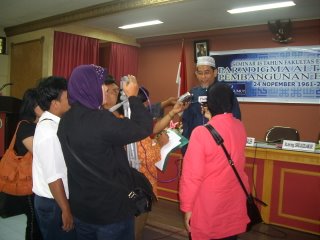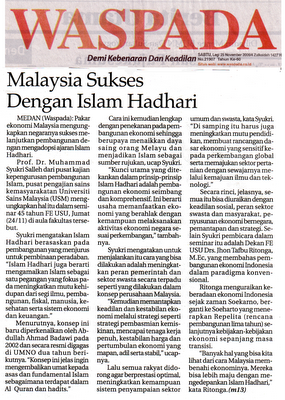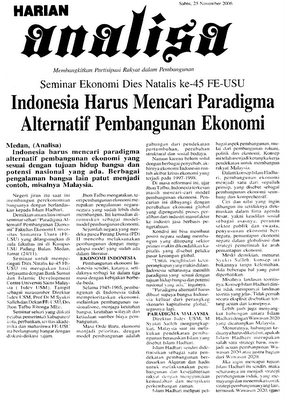I have encountered with such journalists quite a number of times and the latest was in Medan last Friday, 24 November 2006. After giving a talk on Economic Development in Islam Hadhari at 45th Year Anniversary Seminar of the Economic Faculty of Universitas Sumatera Utara (USU), a number of journalists from printed and electronic medias surrounded me for questions. I have been cautious enough to ask them the questions that they are going to ask prior to their recording and shooting of my answers. Consequently, I have refused to answer some questions that I thought were tricky and `trappy', and answered the others that I thought straight forward and manageable.

Surrounded by the journalists
The next morning, on Saturday 25 November 2006, to my surprise a major Medan newspaper came up with a disgusting title: "Malaysia Sukses Dengan Islam Hadhari" (Malaysia Is Succesful With Islam Hadhari), quoting me saying that. It appalled me for at least two reasons.

The paper
Firstly, how could Malaysia is considered as being succeeded in continuing her development by adopting the teaching of Islam Hadhari when Islam Hadhari was only launched two years ago and its action plan has only been designed quite recently and has yet to be implemented fully? It is of course indeed still immatured and too early to judge.
Secondly, the explanation that followed the quotation was only confined to the earlier part of my paper that explained what is Islam Hadhari, while the later part that contained a critical analysis and suggestions for the betterment of the Islam Hadhari, such as the terms used in it, its theoretical framework, its implementational method, its achievement measurement index and its position in national development strategy have been left out totally. The journalist has definitely failed to analyse my paper in full, hence failing to highlight what I was actually wanted to say, that is Islam Hadhari is laudable, but it could still be improved by strengthening the five areas above.
Actually this was not my first encounter with such a journalist. Sometimes in 1990's, a formal newspaper of an opposition party in Malaysia also published my saying at a Premier Lecture of a so-called `satisfactory' accomplishment of development in Kelantan, but leaving out totally my critical analysis and suggestions for the betterment of the development strategy in the state. Like the above journalist in Medan, this journalist took only the earlier `good' part of my speech delivered at the invitation of the State Government of Kelantan, leaving out the critical part of it.
Such a misleading news about my speech also happened during my Professorial Lecture at Universiti Sains Malaysia on 28 July 2001. A journalist quoted me in a Medan newspaper of `my' saying in the Lecture that the Sultan of Kelantan was apprehensive of the PAS government in the state, while in reality I was not even mentioned a word about both parties. The journalist apparently did that to relate his story to my theoretical underpinning of Islamic development explained in the Lecture.
More surprising was my encounter with a journalist of an English newspaper sometimes around 1993-1995 at a hotel in Jalan Macalister, Penang, Malaysia. I was there to listen to the then number two man of the now defunct Darul Arqam, Ustaz Haji Abdul Halim Abbas, to be interviewed by a group of journalists from various newspapers. The interview was supposed to be a session for him to explain about Darul Arqam, in the midst of continuous attacks from Malaysian government in general and Islamic Development Office (JAKIM) in particular. The interview went smoothly in a cordial atmosphere.
But on the way out of the hotel after the interview has completed, Ustaz Haji Abdul Halim was casually asked by the journalist of that English newspaper about the value of the Darul Arqam's wealth. Ustaz Haji Abdul Halim was quite astonished as he understandably did not know the exact value of the wealth at finger tips. Looking Ustaz Haji Abdul Halim in a dumb, the journalist quickly guessed, RM365 millions (around that figure if I am not mistaken)? Ustaz Haji Abdul Halim nodded lazily, still unsure of the exact value.
The next morning, it was the figure that became the headline of the newspaper, not the content of the interview explained by Ustaz Haji Abdul Halim for about an hour or so. Subsequently, other newspapers quoted it and eventually the figure became the `official' figure of the value of Darul Arqam's wealth!
Not long after that, a journalist from the same newspaper also used to suggest to me in an interview after a course at National Productivity Centre in Kepala Batas, Penang that Darul Arqam might still has underground activities eventhough it has been banned by the government. She insisted for my agreement several times and I know that if there was even a little gesture of agreement, it would become the headline the next morning. Luckily I did not do that because it was out of my knowledge whether there were underground activities or otherwise.
For the above reasons too, whenever journalistic students of Universiti Sains Malaysia came to interview me for their Berita Kampus, I either refused them or entertained them but with a condition that they should show me their writings before they publish. But for the most of the times, they never showed up after that. They said they were squeezed by their deadlines and the writings have to go to the press before they could come back to me. The eventual result is expected, viz. usually unsatisfactory!
Undeniably, it is not that I did not try to understand the sub-culture and nature of a journalist's works. Around the time when the former Deputy Prime Minister Anwar Ibrahim was sacked out of UMNO, a journalist of a mainstream Malay newspaper in Malaysia used to release to me that he wanted to quit the job. He said he was stressed with his own hypocritical behaviour - writing stories that he himself actually did not exactly know their truth. He has to do that for the sake of his newspaper's hidden or known objectives. But I did not know exactly why, he is still there until now and in fact has became a prominent editor of the newspaper. May Allah s.w.t. helps and guides him.
In the case of the recent Medan incident, fortunately there was another major newspaper that helped to overcome the misinterpretation. It came with a more correct title: "Indonesia Harus Mencari Paradigma Alternatif Pembangunan Ekonomi" (Indonesia Must Search For An Alternative Development Paradigm).
I say it was correct because this was actually the theme of the seminar, that is Alternative Paradigm of Economic Development. I was invited to talk on Islam Hadhari as one of the possible alternative for Indonesian economic development. It was preceded by an introductory remarks by the Dean of the Economic Faculty of Universitas Sumatera Utara, Drs Jhon Tafbu Ritonga, who critically reviewed the past and prevailing Indonesian economic development paradigm and pointed out for an alternative. And I proceeded with an explanation on and critical analysis of one of the possible alternatives, that is Islam Hadhari that has been introduced in Malaysia.
The right coverage of this newspaper gave me a little bit of relief indeed. I am glad that there are still sharp-minded journalists with analytical capabilities around!







No comments:
Post a Comment